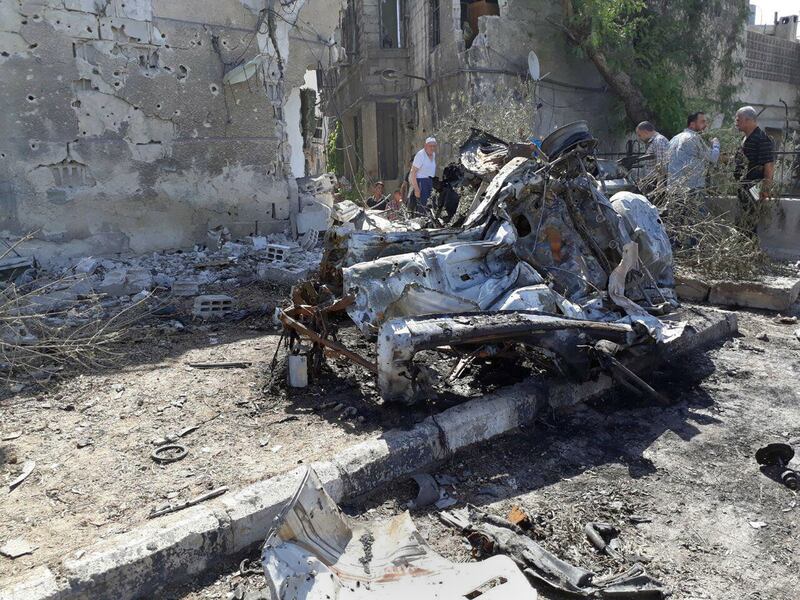DAMASCUS // A suicide car bomber killed at least eight people in a rare attack in the heart of Syria's capital on Sunday morning.
Authorities said they foiled a wider assault by intercepting two other explosives-laden vehicles ahead of the morning commute on the first working day after the Eid holiday.
Security forces tracked all three cars and intercepted two of them at checkpoints on the airport road, the interior ministry said. The third made it into the city centre, where the driver blew himself up near Tahrir Square.
The Syrian minister of local administration, Hussein Makhlouf, said the response marked a "major success in foiling a plot" to cause mass casualties.Syrian state TV reported eight killed and another 12 people wounded in the blast near Damascus's old city. Lebanon's Al Manar TV, which is close to the Syrian government, and Diary of a Mortar, a Syrian activist group in the capital, said at least 19 people were killed.
There was no immediate claim of responsibility for the attack.
Tahrir Square resident Mohammad Tinawi said he heard "gunfire at around 6am, then an explosion which smashed the glass of houses in the neighbourhood".
He saw two wounded soldiers being treated by Red Crescent volunteers.
The blast caused extensive damage to buildings in the square, which was strewn with debris. Two bombed-out cars were visible to one side of the square.
Damascus has been spared the large-scale battles that have devastated other major Syrian cities during the country's six-year civil war, but dozens of people have been killed in bombings, particularly on the outskirts of the capital. Pro-government forces have engaged in heavy fighting against rebels in Damascus suburbs, but have largely kept them out of the city centre.
In mid-March, bomb attacks on a courthouse and restaurant in central Damascus killed 32 people. The bombings, which were claimed by ISIL, came days after two explosions that left 74 dead in the capital's Old City and were claimed by the Tahrir Al Sham coalition led by Jabhat Fatah Al Sham, an extremist group formerly linked to Al Qaeda.
Battlefronts around Damascus have calmed since a May deal that saw opposition fighters withdraw from several districts, along with a separate agreement on "de-escalation" zones - including one in a rebel stronghold just outside the capital.
However, in recent days, Syrian troops and allied forces have been fighting to drive the rebels out of Ain Terma and Jobar, adjacent areas on the city's eastern outskirts that have been under rebel control since 2011.
The rebels said government forces attacked them with chlorine gas overnight, and the Britain-based Syrian Observatory for Human Rights, an opposition monitoring group, said 12 fighters were treated for suffocation. The Syrian military denied the claims, and there was no way to independently verify them.
Sunday's bombings come days before Russian-sponsored talks are to resume in the Kazakh capital, Astana, where the two sides agreed to a ceasefire earlier this year that has been repeatedly violated. The new round of talks is expected to delineate "de-escalation zones".
Russian officials have said the talks would also cover the formation of a Syrian national reconciliation committee.
The ceasefire does not include extremist militant groups such as ISIL, which is facing an intensified assault from US-backed Syrian fighters and pro-government forces supported by Russia, an ally of president Al Assad.
The US-backed Syrian Democratic Forces alliance said on Sunday it had received hundreds of reinforcements in its battle to retake the northern city of Raqqa from ISIL.
The SDF said nearly 1,000 fighters had joined the western and eastern fronts of the battle in Raqqa, Footage posted by activists showed a convoy of vehicles carrying dozens of cheering fighters as they headed toward the city's various fronts.
The campaign against Raqqa, backed by airstrikes from the US-led coalition, began on June 6. ISIL militants have put up a tough fight, but the SDF has advanced on several fronts, seizing a number of neighbourhoods.
SDF fighters seized the Hal market from ISIL on Sunday, after an attack from the south and east of the city, the Observatory said. The advance brings the Kurdish-led forces closer to the heart of Raqqa city, where another front with the extremists is raging. Last week, the fighters seized the last road into the city from the south, nearly completing their siege on ISIL fighters.
* Associated Press and Agence France-Presse





